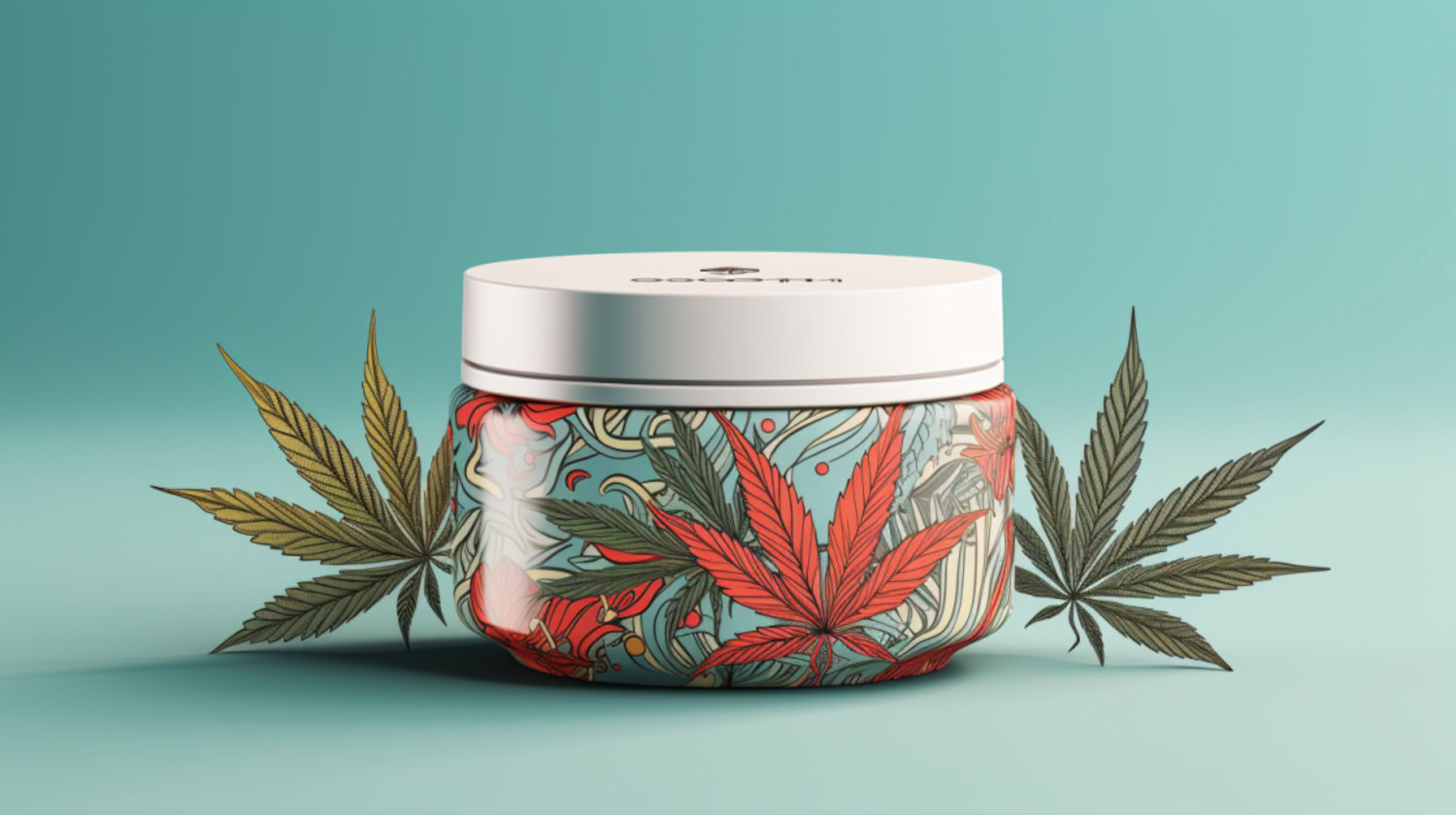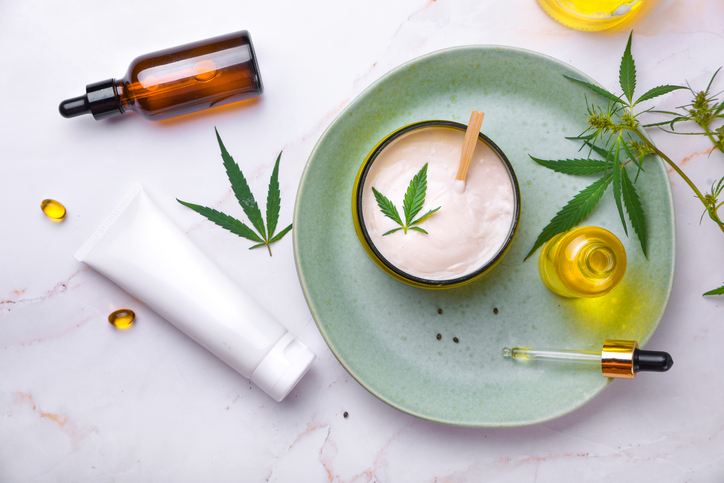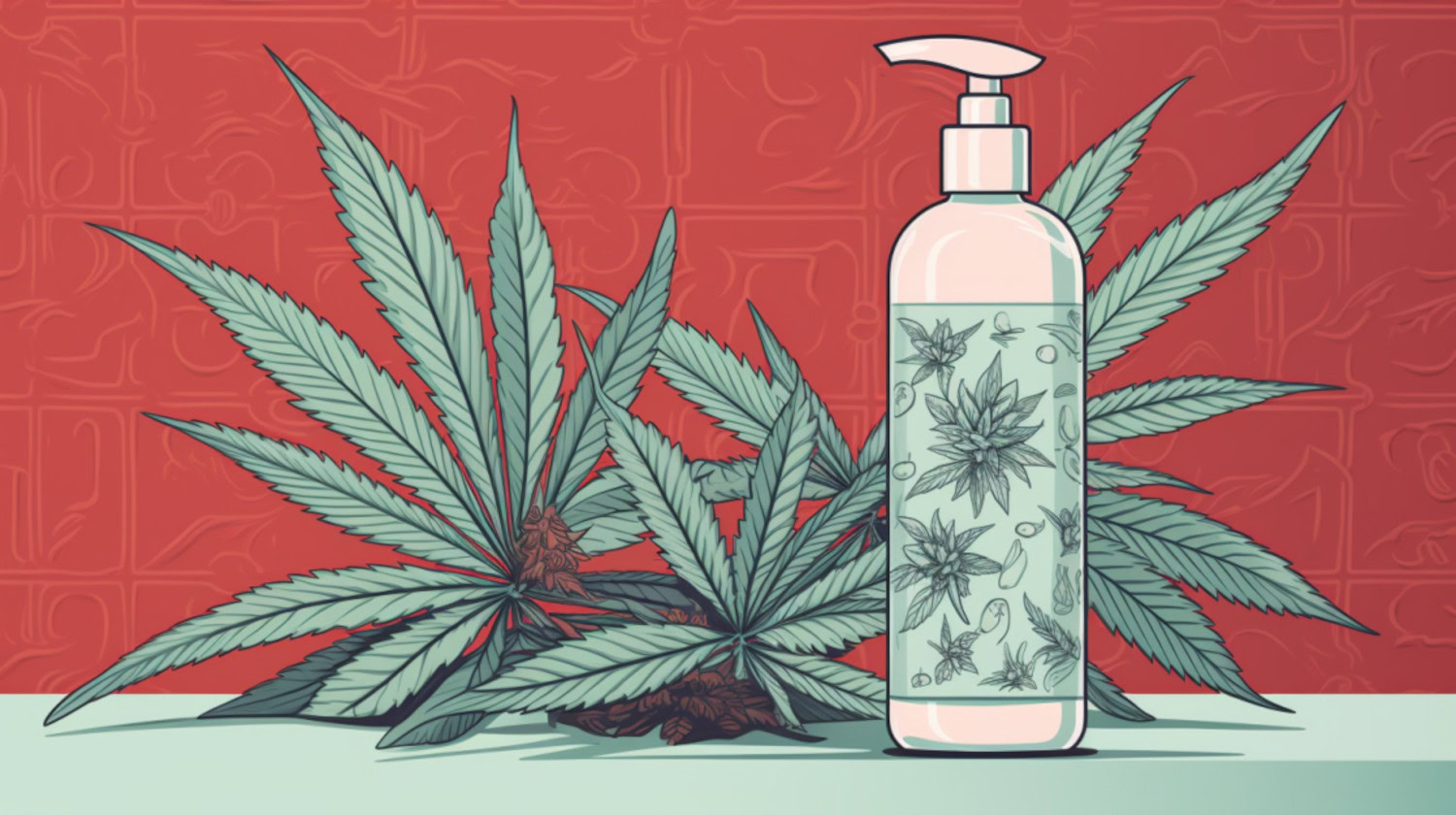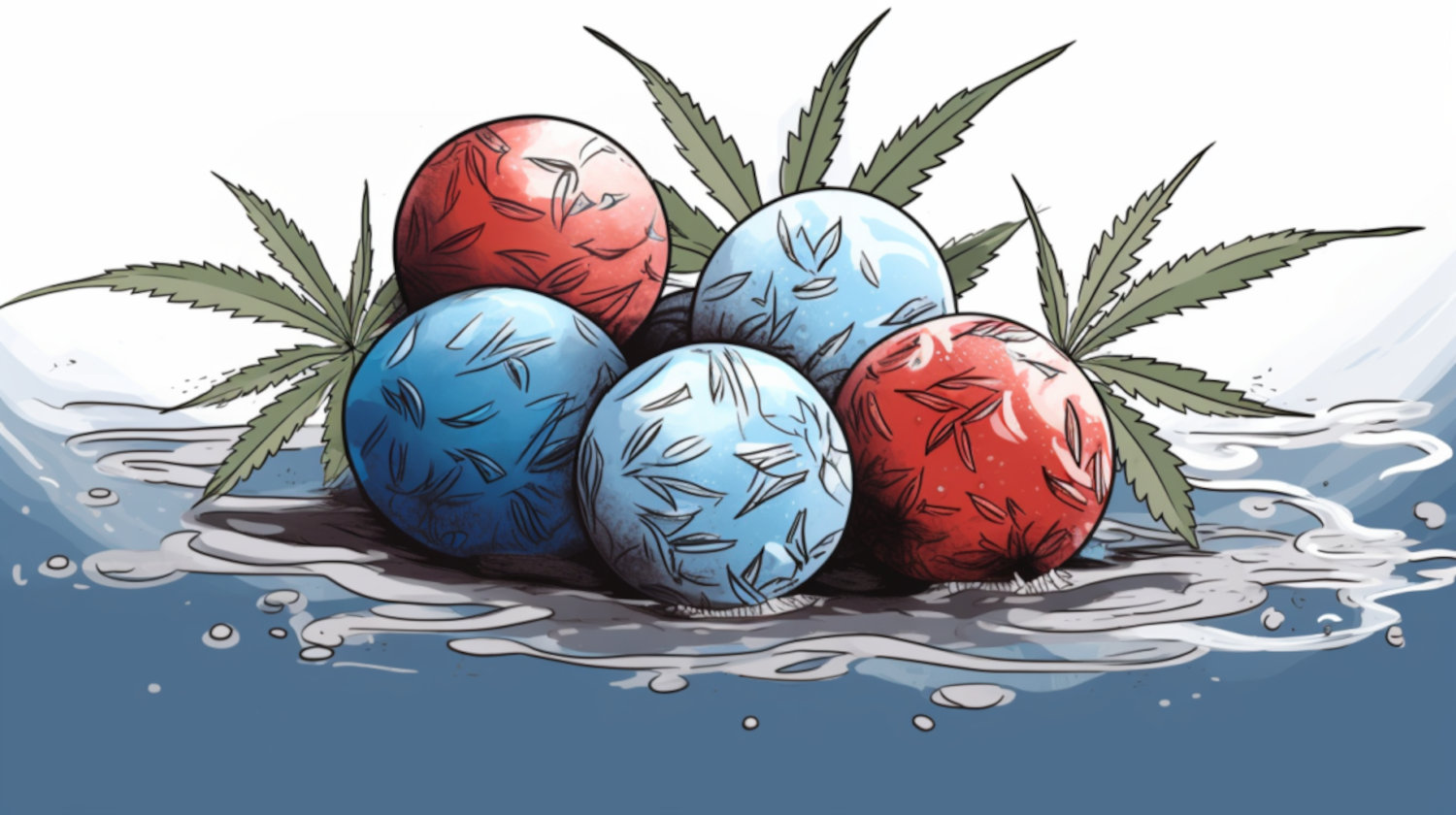In This Article
- What Are Cannabis Topicals?
- How Do Cannabis Topicals Work?
- Benefits of Cannabis Topicals
- Possible Risks of Cannabis Topicals
- Why Don’t Cannabis Topicals Get You High?
- Cannabis Topical Types
- Cannabis Lotion
- Cannabis Creams and Ointments
- Cannabis Balms and Salves
- CBD Oil
- Transdermal Patches
- Cannabis Bath Bombs and Salts
- Other Options
- Availability and Legality of Cannabis Topicals
- Cannabis Topicals FAQ
- What Are Cannabis Topicals Good For?
- Do Cannabis Topicals Help Nerve Pain?
- What is Topical Cannabidiol?
- What Does Cannabis Face Cream Do?
- Do topical THC products show up in drug tests?
- Which topical has the longest-lasting effect?
Key Takeaways
- Cannabis topicals offer localized relief without intoxicating effects (in most cases).
- While most won’t get you “high,” transdermals will reach the bloodstream.
- The legality of cannabis topicals varies by state regulations and product ingredients.
While cannabis topicals make up a small percentage of the market for cannabis sales, less than 1%, according to Headset, many medical patients turn to topicals in their daily lives. From those seeking muscle relief to those hoping to manage chronic pain, many have turned to topicals to address their needs.
What Are Cannabis Topicals?
Cannabis topicals cover a range of products, including lotions, balms, and creams infused with cannabinoids from the cannabis plant, such as THC, CBD, and other compounds.
These products are used for localized relief to the skin, joints, and muscles. They can help ease pain, inflammation, and various skin conditions. Infused topicals are often linked with CBD or THC. However, other cannabinoids, such as THCA, CBG, CBGA, and CBDA, can be found as minor or featured compounds in certain products.
How Do Cannabis Topicals Work?

Cannabis topicals work similarly to non-cannabis-infused skincare or muscle-relief options. Infused topicals interact with the body’s endocannabinoid system (ECS), a complex network of receptors. These receptors play an important role in regulating pain, inflammation, and immune responses.
The ECS contains CB1 and CB2 receptors, which are located in the skin, immune cells, and throughout the body. When cannabinoids, such as CBD and THC, are applied topically, they bind to these receptors, resulting in several effects.
Unlike other popular consumption options, topicals may provide localized relief to areas experiencing neuropathic pain, inflammation, or discomfort. This means that the effect is only felt where the topical method is applied. The only exception to this is with transdermal topicals and patches, which are designed to be slowly absorbed into the body’s bloodstream, often with a longer-lasting effect.
The localized effect created by most topicals has been considered an ideal option for some medical patients, particularly people seeking localized relief for conditions and issues like:
- Acne
- Dermatitis
- Dry skin
- Eczema
- Hives
- Inflammation
- Menstrual pain
- Muscle pains, strains, and sprains
- Neck and head pain
- Pain (short-term and chronic)
- Psoriasis
- Rosacea
- Skin irritation
These effects have been linked to relieving conditions such as arthritis, muscle soreness, and chronic skin conditions, including eczema and psoriasis.
Benefits of Cannabis Topicals
Cannabis topicals provide a range of benefits, particularly for individuals seeking localized relief without the psychoactive effects commonly associated with cannabis consumption.
Some of the most common benefits of using cannabis topicals include:
- Pain Relief: Cannabis topicals are used for their potential to relieve chronic pain, muscle soreness, arthritis, and nerve pain. Topicals allow for targeted application, making them ideal for specific areas of discomfort.
- Skin Health: Topicals infused with cannabinoids like CBD may reduce inflammation and promote healthy skin by soothing conditions like acne, eczema, and psoriasis. Many skincare products now include cannabinoids for their reported antioxidant and anti-inflammatory properties.
- Relaxation: Products like cannabis bath bombs may help users relax by reducing muscle tension and promoting a sense of calm. These products may be particularly useful for individuals looking to unwind after a long day or reduce stress.
There is some documented evidence that CBD may provide benefits for skin conditions, though further research is required.
Additionally, both topical and transdermal applications have been shown to typically generate higher bioavailability rates at steady plasma rates in subjects, allowing more cannabis to enter the body.
Possible Risks of Cannabis Topicals
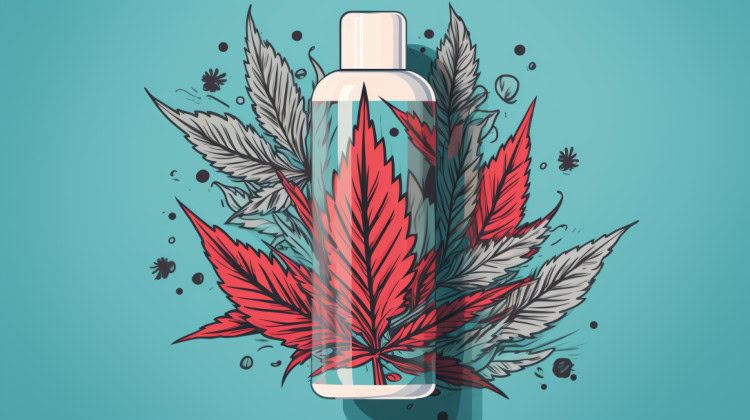
Topicals and transdermal options tend to carry a low-risk profile for consumers. However, every person is different and has a unique medical profile, which may adversely impact the experience. For example, some products may contain allergens or irritants that could aggravate people with certain skin conditions..
Individuals should consult with their physician before using topicals or transdermals. While both may carry low risks, it's always best to practice safety.
Why Don’t Cannabis Topicals Get You High?
Most topicals outside of transdermals are not intended to reach the bloodstream. As such, most topicals won’t produce intoxicating “high” effects.
But why is that the case? Isn’t cannabis, especially THC-infused products, intended to create an intoxicating effect?
While that may seem to be the case, cannabis topicals are designed to deliver targeted relief without causing a high, allowing people to address pain or inflammation without intoxicating effects. Even with transdermals, where the THC can reach the bloodstream, the goal isn’t to make a person feel the intoxicating effects. Instead, it may provide long-lasting relief for their joint, muscle, or skin pains.
Cannabis Topical Types
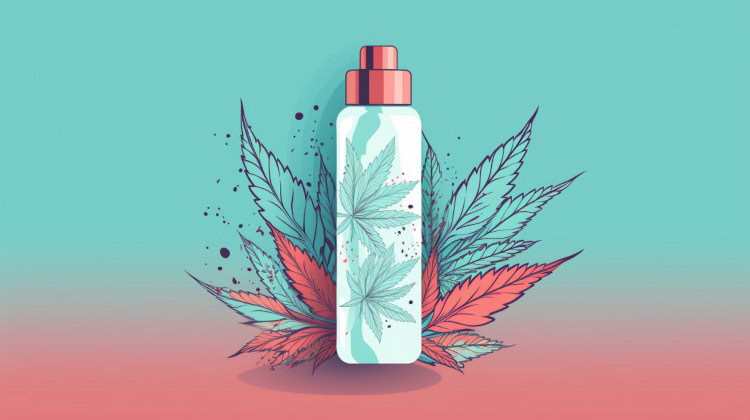
Cannabis topicals come in various forms, offering different potential effects and benefits. Much like non-infused topicals, there are a variety of cannabis topicals to purchase, each possessing unique properties worth considering before buying:
Cannabis Lotion
Cannabis lotions are lightweight moisturizing topicals formulated to treat skin issues like localized dryness, acne, and eczema. These products are typically used for everyday skincare or mild pain relief for surface-level aches and discomfort. Infused lotions may provide hydration and relief to the skin without any greasy feelings often associated with thicker topicals. In certain lab studies, lotions infused with CBD have been linked to reduced inflammation and improved skin health.
Cannabis Creams and Ointments
Cannabis creams and ointments are thicker than lotions. Designed for targeted relief of pain and inflammation, infused creams and ointments often contain CBD or THC, along with other cannabinoids like CBG. These cannabinoids are frequently used to aid conditions like arthritis, muscle pain, and nerve pain.
Various studies have concluded that CBD ointments can be effective in reducing and alleviating a variety of skin-level and deeper pains caused by numerous conditions:
- Arthritis: A study on rats found that CBD ointments made with transdermal ingredients helped relieve arthritis-related pain and swelling.
- Nerve pain: Another study found that patients suffering from nerve damage experienced pain relief after using transdermal CBD ointments.
- Jaw pain: A third study found that patients suffering from jaw pain who applied CBD creams made with transdermal ingredients twice a day experienced pain relief in targeted areas.
Cannabis Balms and Salves
Balms and salves are thicker topicals made with ingredients like beeswax, shea butter, or coconut oil. They are primarily used for localized relief of pain or skin conditions like psoriasis and eczema. These products are typically rich in CBD or THC and provide intense moisture and relief to the skin.
Balms are commonly used by individuals seeking relief from muscle soreness, joint pain, or skin irritations. Their thicker consistency allows balms to stay on the skin longer than lotions or creams. However, their greasiness may not be ideal for all users.
CBD Oil
CBD oil is a versatile product that can be used topically or as a dietary supplement. When applied to the skin, it may help soothe muscle tension and reduce inflammation without reaching the blood. CBD oil is also widely used in skincare products for its potential antioxidant and anti-inflammatory properties. It’s popular for helping improve skin health, particularly for conditions like acne and rosacea, as it may help reduce redness and irritation.2
It's important to note that CBD oil designed for topical use should not be inhaled, as it is not the same as cannabis oil meant for vaping.
Transdermal Patches
Transdermal patches are designed to deliver cannabinoids through the skin and into the bloodstream, providing long-lasting relief for issues like chronic pain, nerve damage, or other conditions that require sustained effects. Transdermal patches offer a convenient option for people seeking long-term relief without needing to reapply lotions or creams.
Because the cannabinoids are absorbed over time, transdermal patches may provide relief for several hours or even an entire day, depending on the product. In most cases, products will cause an effect lasting anywhere from six to 24 hours. Due to the nature of transdermal delivery, infused patches can cause intoxicating effects if they contain high concentrations of THC, especially if they are not time-released.
Cannabis Bath Bombs and Salts
Cannabis bath bombs and salts are dissolved in warm water and absorbed into the skin while the consumer soaks. While these products generally don’t produce intoxicating effects, a feeling of deep relaxation is common due to commonly reported effects, like relieved muscle tension.
Infused bath bombs have been linked to soothing sore muscles, reducing inflammation, and promoting relaxation, making them a popular choice for those seeking a full-body therapeutic experience.
Other Options
To make it easier for the cannabinoids to pass through the skin barrier, topical producers can use oleic acid and ethanol to help deliver cannabinoids further into the body. Nanoemulsions, or methods that break cannabis oil down to microscopic particles, may also effective at penetrating the skin and reaching the bloodstream.2
Additionally, products like intimate lubricants have become popular in recent years, expanding the possible benefits to the bedroom as well.
Availability and Legality of Cannabis Topicals

State regulations dictate the availability and legality of infused topicals. CBD-based topicals made from hemp are widely available in most states, made possible by the passage of the 2018 Farm Bill, which federally legalized hemp production and sales based on several parameters. On the other hand, THC-infused topicals remain illegal on the federal level. They are only legal in states that have legalized medical or recreational cannabis programs, which permit topicals to be made and sold.
As of December 2024, THC and THC-infused topicals remain illegal in the following states:
- Georgia
- Idaho
- Indiana
- Iowa
- Kansas
- Kentucky (legalizing soon)
- Nebraska
- North Carolina
- South Carolina
- Tennessee
- Texas
- Wisconsin
- Wyoming
Under the current Farm Bill, consumers can only purchase hemp-derived CBD topicals that contain less than 0.3% THC, a key parameter of the 2018 Farm Bill. There is hope that with the federal government possibly moving to reschedule cannabis to Schedule III, access to THC-infused topicals could increase in the near future. However, that is merely conjecture at this time.
Cannabis Topicals FAQ
What Are Cannabis Topicals Good For?
Cannabis topicals are primarily used for pain relief, inflammation, and skin conditions. They are typically favored by individuals who need localized relief without the intoxicating effects associated with cannabis consumption. However, a select few transdermal topicals may produce intoxicating effects.
Do Cannabis Topicals Help Nerve Pain?
Yes, research appears to show that cannabis topicals, especially those containing CBD, may help relieve nerve pain.
What is Topical Cannabidiol?
Topical cannabidiol (CBD) refers to products infused with CBD that are applied to the skin to relieve pain, inflammation, and skin conditions locally.
What Does Cannabis Face Cream Do?
Cannabis face creams, particularly CBD ones, are designed to soothe skin irritation, reduce redness, and provide antioxidant benefits. They are popular for improving skin health and maintaining a clear complexion.
Do topical THC products show up in drug tests?
Cannabinoids in a standard topical product will not reach your bloodstream, meaning their appearance on a drug screening is highly improbable. However, transdermal cannabis products can reach the bloodstream and could potentially trigger a positive drug test.
Which topical has the longest-lasting effect?
Transdermal topical cannabis products are often the ones with the longest-lasting effect due to their time-released nature, ranging between 6 to 24 hours. Non-transdermal products don't last as long, typically up to 4 hours. Many individuals use topicals as needed, varying wildly depending on the person.
The information in this article and any included images or charts are for educational purposes only. This information is neither a substitute for, nor does it replace, professional legal advice or medical advice, diagnosis, or treatment. If you have any concerns or questions about laws, regulations, or your health, you should always consult with an attorney, physician or other licensed professional.

